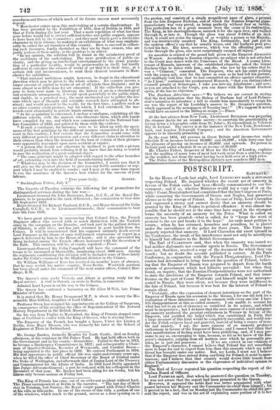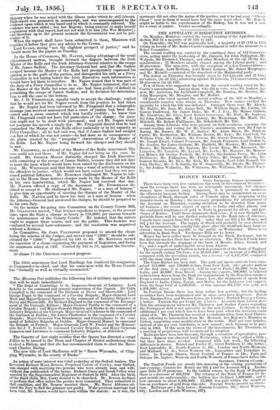POSTSCRIPT.
SATunidi;
In the House of Lords last night, Lord LYNDHURST made a statement respecting Poland. He inquired whether the recent act of amnesty in
favour of the Polish exiles had been officially communicated to our Go- vernment; and if so, whether Ministers would lay a copy of it on the table ? Count Montalembert had complained that the late Congress at Paris,
while censuring the Governments of Greece and Naples' had preserved
silence as to the wrongs of Poland. In the case of Italy, Lord Clarendon; had expressed a strong and earnest desire that an amnesty should be
granted by the King of Naples to political offenders : it was almost im- possible that he should not at the same time have urged in the strongest terms the necessity of an amnesty for the Poles-. What is called an
amnesty has been granted—what is called, for it "keeps the word ot promise to the ear and breaks it to the hope." An exile must petition to return ; when he has returned, houseless and penniless, he is placed
under the surveillance of the police for three years. The Poles have properly rejected that amnesty. If Lord Clarendon did exert himself in the Conference, the result of his interference must not only be mortifying to himself but offensive to the British Government.
The Earl of CLARENDON said, that when the amnesty was issued we had neither diplomatic nor consular agents in Russia. The Government
have not, therefore, received a copy of the document for which they can.
vouch ; but no doubt the account published is correct. At the Paris Conference, in conjunction with the French Plenipotentiary, Lord Cla-
rendon had determined to bring forward the question of Poland, believ-
ing that the Emperor of Russia was prepared to depart from the harsh. system of government which had hitherto prevailed : but when they
found, on inquiry, that the Russian Plenipotentiaries were not authorized to state the intentions of the Emperor towards Poland, and that inter- ference on the part of Count Walewski and himself might be misrepre-
sented in Russia they were silent, not because they were indifferent to. the fate of Poland, but because it was best for the interest of Poland to remain silent.
"Certainly, after the expression of clement intentions on the part of the Emperor of Russia upon his accession to the throne, I for one did look for a realization of those intentions ; and in common with every one_else I have felt disappointment at this so-called amnesty. I am unable to account for what has led to an act of clemency so restricted in its nature, and which,
must be inoperative ; but I do know that the mere rumour of a real and gene- ral amnesty produced the greatest enthusiasm in Warsaw in favour of the
Emperor, and justified the belief which was entertained in Paris that a large measure of this kind would be completely successful, and would ren- der the Polish subjects loyal and grateful, instead of being a source of trou- ble and anxiety. I say, the mere rumour of an amnesty produced enthusiasm in favour of the Emperor of Russia ; and I cannot but think that that manifestation of feeling must have been gratifying, and, if I may pre- sume to say so, encouraging to him, because, as far as we know of the Em- peror's character, judging from all matters over which be personally pre- sides, he is just and generous If we are correct in our estimate of the Emperor's character, I cannot believe that Poland has not something more to hope for and to expect from him than this amnesty which my noble friend has brought under our notice. But, my Lords, I must say I believe that if the Emperor does intend doing anything for Poland, it must be spon- taneous; and I believe that that country would derive little benefit from either Parliamentary discussion or the expression of individual opinion in, England."
The Earl of Luce)/ repeated his question respecting the report of the Chelsea Board of Officers.
Lord PANXUAR Said, that when he answered the question on Tuesday, he was not aware that the report had been presented to the Queen. However, it appeared the noble Earl was better acquainted with what passed between her Majesty and the Commander-in-chief than himself; for it proved to be a fact, that on Monday last the Commander-in-chief did pre-- sent the report, and was in the act of explaining some portion of it to her
Majesty when he was seized with the illness under which he still labours. That report was presented in manuscript, and was unaccompanied by the evidence upon which it was based-and to which it constantly referred. The evidence was now added ; but her Majesty, being anxious to make herself acquainted with that report, had not yet sent it to him [the War Minister] ; and therefore up to the present moment the Government was not in pos- session of it. When the report shall have been submitted to them, Ministers will consider it before they give any advice to the Crown. Lord Lucax, seeing "not the slightest prospect of justice," said he hould move for the papers on Tuesday.
In the House of Commons, Mr. Naeren, taking advantage of the usual adjournment motion, brought forward the dispute between the Irish Master of the Rolls and the Irish Attorney-General relative to the escape of Mr. James Sadleir. The Attorney-General had said that Mr. Sadleir escaped because the Master of the Rolls had precipitately expressed his opinion as to the guilt of the parties, and disregarded his oath as a Privy Councillor in not laying before the Irish Executive such information as would have led them to interfere. Mr. Napier denied that it was part of the duty of a Privy Councillor to do so. Mr. Napier intimated, that not the Master of the Rolls but some one else had been guilty of default in permitting the escape of James Sadleir, and he declared his determina- tion to sift the case to the bottom. Mr. J. D. Fri:scant/am, equally ready to accept the challenge, replied that he would not let Mr. Napier recede from the position he had taken up. Mr. Napier had been informed by Mr. Fitzgerald that a telegraphic message just received announced that a court of justice had been dese- crated and a scene enacted which was hardly credible ; he knew that Mr. Fitzgerald could not have full particulars of the charge ; the ques- tion ought not to be dealt with piecemeal ; and yet Mr. Napier would not postpone his speech a single day. Mr. Fitzgerald denied that he had impeached the Master of the Rolls either judicially or in his capacity ax Privy Councillor' all he had said was, that if James Sadleir had emitted —a fact of which he was not aware—he had done so in consequence of the alarm created by the "irregular" observations of the Master of the Rolls. Let Mr. Napier bring forward his charges and they should be met.
Mr. CARDWELL, as a friend of the Master of the Rolls, intervened. The case could not rest there : if Mr. Napier did not bring on the case, he would. Mr. GEORGE MOORE distinctly charged the Irish Executive with conniving at the escape of James Sadleir, because they did not dare to meet the issue which would have been raised by the disclosures on his trial. Mr. WHITESIDE said that there was a want of activity in bringing the offenders to justice, which would not have existed had they not pos- sessed political influence. Mr. Roamers challenged Mr. Napier to sub- mit to the House those distinct charges made by the Master of the Rolls in his own handwriting, which Mr. Napier had received that day. Mr. NAPIER. offered a copy of the document. Mr. FrrzomiaLn de- clined to accept it. He challenged Mr. Napier, "as a man of honour," to give him an opportunity of meeting the charges of the Master of the Rolls. Mr. NAPIER said he knew his duty as a man of honour : when the Attorney-General had answered the charges, he should be prepared. to o his OWII duty. On the motion for going into Committee on the County Courts Bill, Mr. GLADSTONE moved, "that it is not expedient to impose, at the present time, upon the State a charge so heavy as 170,000/. per annum towards the maintenance of the County Courts." He insisted that the suitors ought to support these courts, and not the public. This doctrine was combated by several Law-reformers ; and the resolution was negatived without a division.
In Committee, Sip JOHN PAM:NG-TON proposed to amend, the claim fixing the salaries of the Judges, and moved that "15001." should be sub- stituted for "1200?." Negatived by 185 to 63. Mr. KENDALL moved the insertion of a clause regulating the payment of Registrars, and fixing the minimum salary at 120/. Carried by 162 to 73, against the Govern- ment.
At clause 71 the Chairman reported progress.



























 Previous page
Previous page